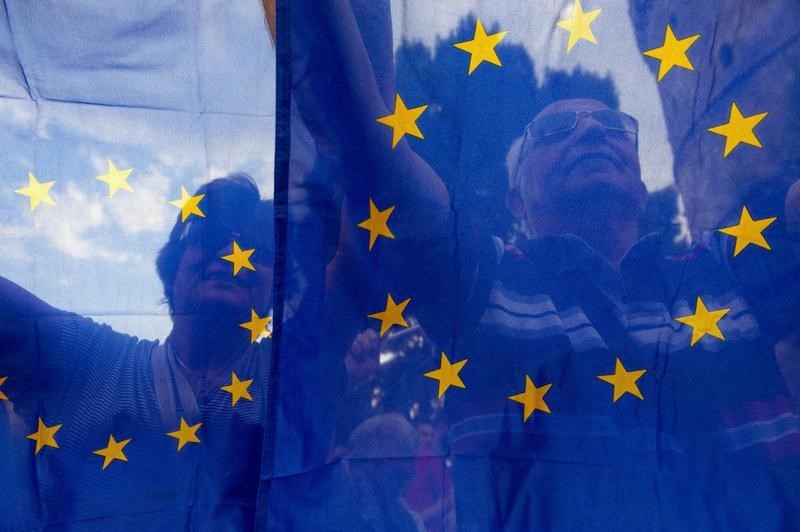By Marc Jones
LONDON (Reuters) - Having navigated China's troubles better than most emerging markets this year, central Europe now risks being pegged back by a few worries of its own.
The list includes a shake-up of Polish and Romanian politics, hundreds of thousands of migrants funnelling through the region and the impact scandal-ridden Volkswagen's (DE:VOWG_p) problems will have on a region that makes one in every six of Europe's cars.
The immediate worry is Poland - the star European economic performer in recent years and the only European Union country to avoid recession after the 2008-09 financial crisis - which will hold a general election on Oct. 25.
Polls have been steadily pointing to a win by the populist Law and Justice (PiS) opposition party whose plans for vast welfare spending, a significant increase in non-taxable income and a lower retirement age, are unsettling investors.
Polish shares (WIG20) are down more than 8 percent this year, compared with rises in the rest of the region. Bank stocks were hit particularly hard after PiS floated new financial taxes and while bonds (PL10YT=RR) have largely held their own, the zloty has also suffered noticeably.
The currency has lost more than 4 percent against the euro since July. (EURPLN=D4) And whereas Hungary's forint <HUFUSD=R> is up 4 percent against the dollar since the Federal Reserve opted not to hike U.S. interest rates last month and the rand (ZARUSD=R) and rouble (RUBUSD=R) have jumped 7 and 9 percent, the zloty has stayed rooted to the spot.
"There are some worries that if the Law and Justice party does get to form the next government - there is probably at least a 50 percent chance - that it will push through at least some of its election pledges," said Paul Fage, an emerging market strategist at TD Securities in London.
Uncertain politics are not the only concern.
Data from Germany - Poland's biggest export partner accounting for almost 27 percent of the total - have undershot forecasts in recent weeks, suggesting Europe's largest economy has been losing momentum. The fallout of Volkswagen's scandal is also expected to weigh.
Poland will not be the only country affected by VW's problems, whose admission that it rigged diesel emissions tests has tarnished its reputation and is likely to dent sales.
Barclays (L:BARC) estimates that VW's factories generate 0.5-2.9 percent of gross domestic product (GDP) in Czech Republic, Slovakia, Hungary and Poland.
In a worst case scenario of a 20 percent drop in global VW production, Barclays reckons it could depress GDP growth in those countries by between 0.1 and 0.6 percentage points.
"Our analysis shows a reduction in output may result in a visible economic impact, possibly not limited to the automotive industry," Ivan Bokhmat at Barclays said, although he also thought there would be a quick bounce back from any dip.
SCHENGEN BLOCKS?
There are still some factors to support central Europe's markets.
Most countries have current account surpluses - a major difference to more 'fragile' emerging economies. The region imports most of its oil and metals and has little direct exposure to China which is casting by far the biggest shadow over investor sentiment.
There are hopes the bloc will benefit from the spillover if the European Central Bank, as is expected, expands its euro zone stimulus programme in the coming months.
Still, there are some niggling concerns.
In Romania, political uncertainty has placed question marks over whether the International Monetary Fund (IMF) will grant the country a new credit line.
Prime Minister Victor Ponta is due to stand trial for corruption and the country is heading for elections next year. The economy has been supported by a series of aid deals from the IMF and the European Commission since 2009, and the latest one expired in September.
The impact on the region of the influx of people fleeing war and poverty in the Middle East, Asia and Africa has also yet to be quantified. But it has sparked bitter recriminations over how to share out responsibility and disputes over border controls are unwittingly restricting the flow of goods between countries.
Refugees and migrants arriving in Greece and Italy have been streaming north to reach more affluent nations such as Germany, prompting countries in central and eastern Europe alternately to try to block the flow or shunt it on to their neighbours.
The United Nations expects 400,000 migrants to flood into Europe this year and 450,000 next year. The EU last month approved a plan to share 120,000 of the arrivals across its 28 states, but the Czech Republic, Slovakia, Romania and Hungary voted against it.
Bigger western neighbours have hit back. In an interview with Bild newspaper, German Economy Minister Sigmar Gabriel warned countries that do not share European values of human empathy and solidarity cannot count on funding from the bloc.
His comments, and a similar threat by Interior Minister Thomas de Maiziere, were a thinly veiled jab at the likes of Hungary, which has built a razor-wire fence along its border with Serbia and now doing similar on its border with Croatia.
With so much to lose economically, Anna Zabrodzka at Moody's analytics said it was "puzzling" that so many central European countries were taking such a resistant stance.
"Their governments should be championing an EU-wide policy response that would urge countries to lift border controls and prevent others from introducing them," Zabrodzka said.
"The imposition of temporary border controls across some parts of the EU's Schengen zone is already disrupting cross‐border trade, with long traffic jams and rising costs for many firms."
